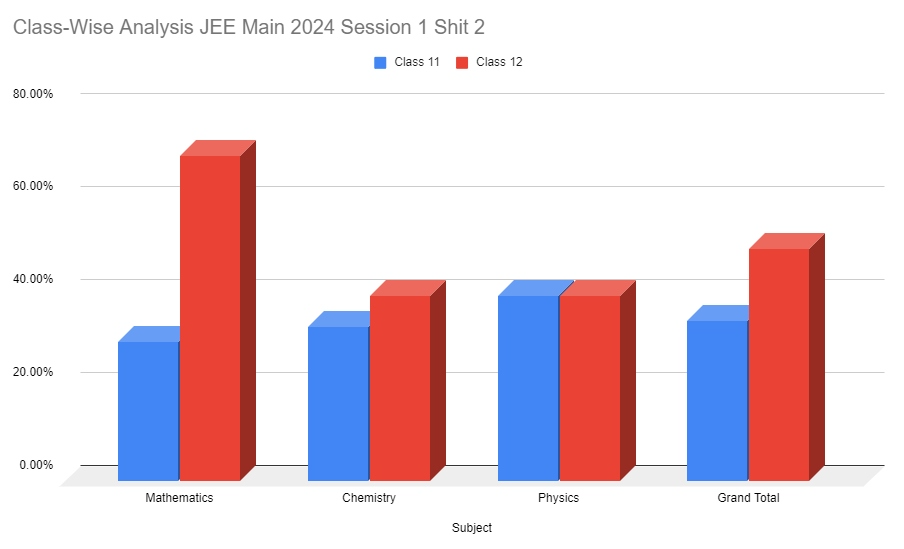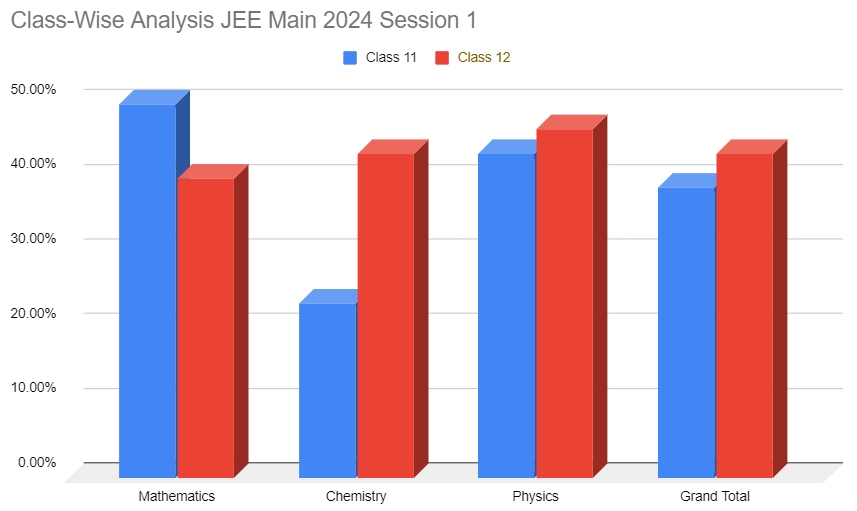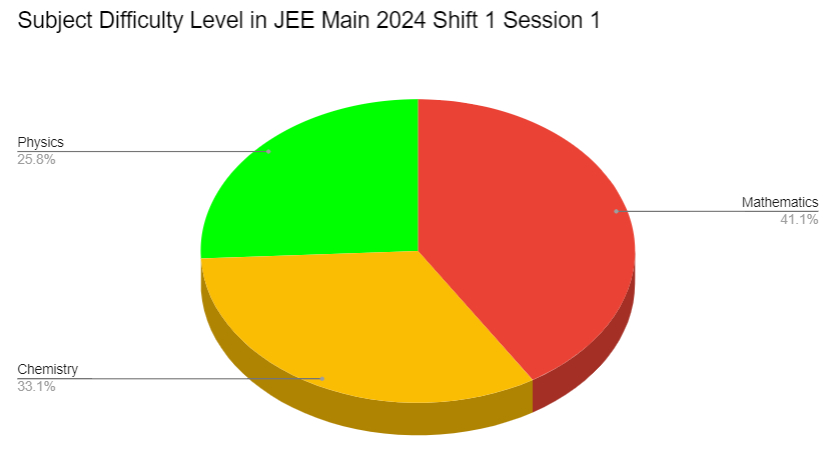JEE Main 2024 Exam Toughest Shift: The Joint Entrance Exam (JEE) Main 2024 Session 1 is over, and applicants who attended the exam are now taking a breath of relief with curiosity to know more about the paper and their score. One of the things that is floating fast is the desire among JEE Main candidates to determine the toughest shift of the JEE Main 2024 January session. The difficulty level directly affects the cutoff. More difficult papers tend to have a lower cutoff, and vice versa.
Let us explore this in more detail with the help of the JEE Main Session 1 analysis provided by Resonance. This analysis will be based on the memory-based questions asked by candidates and thus might not get along with the final JEE Main 2024 answer key and cutoff.
JEE Main 2024 Session 1 Highlights
Check the important dates and information from the table below:
| Exam | Joint Entrance Test (Main)/JEE (Main) |
| Exam Conducting Body | National Testing Agency (NTA) |
| Official Website | jeemain.nta.ac.in |
| Paper 2A and 2B Dates | January 24, 2024 (Second Shift) |
| Paper 1 Dates | January 27, 29, 30, 31 and February 1, 2024 |
| Paper 1 Shifts | Two Shifts Shift 1: 9:00 am to 12:00 noon Shift 2: 3:00 pm to 6:00 pm |
JEE Main 2024 Paper 1 Overall Analysis: Shift 1 and Shift 2 of All Days
The analysis provided here is based on the one conducted by the experts at Resonance, and we do not claim its authority. The JEE Main candidates will be able to get here a complete in-depth analysis for the B.E./B. Tech. JEE Main exam 2024, shift 1, for all days. This analysis covers shift 1 and shift 2 of all five days of Paper 1.
The analysis was designed based on memory-based questions and thus may vary from the original merit or cutoff.
Class-Wise Analysis JEE Main 2024 Session 1
All Shift 1: As per the data, in the overall analysis of class-wise weightage in the JEE Main 2024 January session, the major portion was from the syllabus of Class 12. Around 38.89% of the questions were from the Class 11 syllabus, and 43.33% were from Class 12.
| Subject | Total Percentage | |
|---|---|---|
| Class 11 | Class 12 | |
| Mathematics | 50.00% | 40.00% |
| Chemistry | 23.33% | 43.33% |
| Physics | 43.33% | 46.67% |
| Grand Total | 38.89% | 43.33% |
All Shift 2: As per the data, in the overall analysis of class-wise weightage in the JEE Main 2024 January session, the major portion was from the syllabus of Class 12. Around 34.44% of the questions were from the Class 11 syllabus, and 50.00% were from Class 12.
| Subject | Total Percentage | |
|---|---|---|
| Class 11 | Class 12 | |
| Mathematics | 30.00% | 70.00% |
| Chemistry | 33.33% | 40.00% |
| Physics | 40.00% | 40.00% |
| Grand Total | 34.44% | 50.00% |

Subject-wise Difficulty Level JEE Main Session 1
For this part the questions from each subject were rated on a scale of 1 to 3. The experts gave the rating to each question and their total was then analysed. Check the table for more clarity.
| Subject | Easy | Medium | Difficult | |||
| No. of Questions | Combined Marks | No. of Questions | Combined Marks | No. of Questions | Combined Marks | |
| Mathematics | 3 | 12 | 9 | 36 | 8 | 32 |
| Chemistry | 7 | 28 | 9 | 36 | 8 | 32 |
| Physics | 18 | 72 | 7 | 28 | 2 | 8 |
| Total | 28 | 112 | 34 | 136 | 12 | 48 |

Check the graph below to determine the subject-wise difficulty level.
As per the analysis we can say that the subject difficulty was in the following order: Mathematics> Chemistry>Physics
On the scale of 1 to 3 check the overall difficulty level below:
| Subject | Difficulty Level |
| Mathematics | 2.25 |
| Chemistry | 1.81 |
| Physics | 1.41 |
Topic-Wise Analysis JEE Main Shift 1 Session 1
As per the referring source, they analysed a total of 27 questions from Physics, 27 questions from Chemistry and 20 questions from Mathematics. Based on this information, they have created a topic-wise analysis for Class 11 and 12. Check out the table below:
Physics Analysis
| UNIT & TOPIC NAME | NO. OF QUESTIONS | TOTAL MARKS | (%) WEIGHTAGE |
| Physics | 27 | 108 | 90.00% |
| Class-12 | 14 | 56 | 46.67% |
| Current Electricity | 3 | 12 | 10.00% |
| Combination of resistance and Combination of Cells | 1 | 4 | 3.33% |
| Current in conductor, Definition of Current, Current Densities and Drift Velocities | 1 | 4 | 3.33% |
| Voltmeter, ammeter, galvanometer | 1 | 4 | 3.33% |
| Electrostatics | 1 | 4 | 3.33% |
| Coulomb's Law | 1 | 4 | 3.33% |
| Geometrical Optics | 1 | 4 | 3.33% |
| Combination of Lenses/Lens and Mirrors | 1 | 4 | 3.33% |
| Gravitation | 1 | 4 | 3.33% |
| Acceleration due to Gravity (g) | 1 | 4 | 3.33% |
| Modern Physics-1 | 2 | 8 | 6.67% |
| Bohr's Theory for Hydrogen, Hydrogen Like Atoms (Properties), Electronic Transition In The H/H-Like Atom / Species and Effect of Motion of Nucleus | 1 | 4 | 3.33% |
| De-Broglie Wave, Uncertainty principle & Davison Germar exp. | 1 | 4 | 3.33% |
| Modern Physics-2 (Nuclear Physics) | 1 | 4 | 3.33% |
| Nucleus & Nucleus stability (Mass defect, BE, alpha, beta decay | 1 | 4 | 3.33% |
| Semi Conductor | 1 | 4 | 3.33% |
| Special Diode | 1 | 4 | 3.33% |
| Alternating Current | 1 | 4 | 3.33% |
| AC Source With RLC, RC, RL Connected In Series | 1 | 4 | 3.33% |
| Capacitor | 1 | 4 | 3.33% |
| Circuits With Capacitor and Use of KCL and KVL, Combination of Capacitors | 1 | 4 | 3.33% |
| Wave Optics (Light waves - Youngs experiment) | 1 | 4 | 3.33% |
| Diffraction & Polarisation | 1 | 4 | 3.33% |
| Magnetic Field | 1 | 4 | 3.33% |
| Magnetic Field Due To Ring, Circular, Arc & Combination of various shapes | 1 | 4 | 3.33% |
| Class-11 | 13 | 52 | 43.33% |
| Elasticity | 1 | 4 | 3.33% |
| Elasticity, Elastic Behaviour, Young Modulus | 1 | 4 | 3.33% |
| KTG and 1st Law of Thermodynamics | 2 | 8 | 6.67% |
| First law Thermodynamics & Specific heat in Different process | 1 | 4 | 3.33% |
| Calculation of work in different Thermodynamics Process | 1 | 4 | 3.33% |
| System of particles, Centre of Mass, Momentum and Collision | 3 | 12 | 10.00% |
| Conservation of Momentum | 1 | 4 | 3.33% |
| Calculation of Centre of Mass | 2 | 8 | 6.67% |
| Unit and Dimension | 1 | 4 | 3.33% |
| Dimensional Analysis | 1 | 4 | 3.33% |
| Friction | 1 | 4 | 3.33% |
| Block Problems (Two & More than Two Blocks and extra problems) | 1 | 4 | 3.33% |
| Sound Waves | 1 | 4 | 3.33% |
| Beats & Doppler Effects | 1 | 4 | 3.33% |
| Circular Motion | 1 | 4 | 3.33% |
| Circular Motion in Horizontal Plane | 1 | 4 | 3.33% |
| Rectilinear Motion | 1 | 4 | 3.33% |
| Definition related problems (distance, displacement, average velocity, average speed, instantaneous velocity, instantaneous speed, average acceleration and instantaneous acceleration) | 1 | 4 | 3.33% |
| Error and Measurement | 2 | 8 | 6.67% |
| Error Definition & Types of Errors | 1 | 4 | 3.33% |
| Varnier's Callipers | 1 | 4 | 3.33% |
Chemistry Analysis
| UNIT & TOPIC NAME | NO. OF QUESTIONS | TOTAL MARKS | ( % ) WEIGHTAGE |
| Chemistry | 27 | 108 | 90% |
| Physical Chemistry | 9 | 36 | 30.00% |
| Class - 12 | 26 | 8 | 6.67% |
| Electrochemistry | 1 | 4 | 3.33% |
| Application Of Nernst Equation In Different Type Of Electrodes And Cells | 1 | 4 | 3.33% |
| Solution Colligative Properites | 1 | 4 | 3.33% |
| Degree of lonisation / Dissociation For Weak Electrolytes | 1 | 4 | 3.33% |
| Class - 11 | 7 | 28 | 23.33% |
| Atomic Structure | 2 | 8 | 6.6 |
| Calculation Related To Nucleus | 1 | 4 | 3.33% |
| De Broglie Wavelength And Uncertainty Principle | 1 | 4 | 3.33% |
| Mole concept | 3 | 12 | 10.00% |
| Stoichiometry , Equation Based Calculations ( Elementary Level Single Equation Or 2 ) | 1 | 4 | 3.33% |
| Balancing Redox Reactions | 2 | 8 | 6.67% |
| Ionic Equilibrium | 1 | 4 | 3.33% |
| Salt hydrolysis , pH calculation Solutions of salt of monoprotic acid and monoacidic base | 1 | 4 | 3.33% |
| Thermodynamics | 1 | 4 | 3.33% |
| Adiabatic And Isothermal Processes | 1 | 4 | 3.33% |
| Inorganic Chemistry | 8 | 32 | 26.67% |
| Class - 12 | 2 | 8 | 6.67% |
| Coordination Compound | 2 | 8 | 6.67% |
| Valence Bond Theory + Crystal Field Theory ( Part - I ) | 1 | 4 | 3.33% |
| General Introduction Of Complex Salts And Definitions To Be Used | 1 | 4 | 3.33% |
| Class - 11 | 6 | 24 | 20.00% |
| Chemical Bonding | 5 | 20 | 16.67% |
| Vsepr Theory | 1 | 4 | 3.33% |
| Fajan's Rule And Its Applications | 1 | 4 | 3.33% |
| Applications Of H - Bond | 1 | 4 | 3.33% |
| Acidic and basic character | 1 | 4 | 3.33% |
| Types Of Chemical Bond And Octet Rule | 1 | 4 | 3.33% |
| Periodic Table Periodicity | 1 | 4 | 3.33% |
| Atomic And lonic Radius | 1 | 4 | 3.33% |
| Organic Chemistry | 10 | 40 | 33.33% |
| Class -12 | 8 | 32 | 26.67% |
| Biomolecule and Polymer | 1 | 4 | 3.33% |
| Nucleic Acids and Lipids | 1 | 4 | 3.33% |
| Haloalkane & Haloarenes | 1 | 4 | 3.33% |
| Introduction to reaction Mechanism | 1 | 4 | 3.33% |
| Aromatic Compounds (Benzene, Aryl halide, Phenol, Amines & Diazonium salt ) | 4 | 16 | 13.33% |
| Aromatic Compounds (Benzene ,Aryl Halide ,Phenol ,Amines And Diazonium Salt ) | 1 | 4 | 3.33% |
| Electrophilic Aromatic Substitution | 3 | 12 | 10.00% |
| Streoisomerism | 1 | 4 | 3.33% |
| Calculation of Number of Stereoisomers | 1 | 4 | 3.33% |
| Oxidation &Hydrolysis of Organic | 1 | 4 | 3.33% |
| Reduction | 1 | 4 | 3.33% |
| Class -11 | 2 | 8 | 6.67% |
| IUPAC &Structural Isomerism | 1 | 4 | 3.33% |
| IUPAC -Nomenclature Of Functional Groups (Sulfonyl ,Ketone ,Hydroxyl ,Amine Group Etc. ) | 1 | 4 | 3.33% |
| Structural Identification | 1 | 4 | 3.33% |
| Elements detection and Chromatography | 1 | 4 | 3.33% |
Mathematics Analysis
| UNIT & TOPIC NAME | NO OF QUESTIONS | TOTAL MARKS | (%) WEIGHTAGE |
| Maths | 20 | 80 | 66.67% |
| Class-12 | 13 | 52 | 43.33% |
| Application of Derivatives | 1 | 4 | 3.33% |
| MONOTONICITY (INTERVALS OF MONOTONICITY) | 1 | 4 | 3.33% |
| Definite Integration | 3 | 12 | 10.00% |
| Properties of Definite Integration (Property V-VI (Five and six) (king rule)) | 1 | 4 | 3.33% |
| Properties of Definite Integration (Property IV (Even odd function)) | 1 | 4 | 3.33% |
| Application of Definite Integration as Area Under Curve (Area of Curve with a Straight Line) | 1 | 4 | 3.33% |
| Differential Equation | 2 | 8 | 6.67% |
| Method of Solving Differential Equation (Integrating Factor Method (linear Differential Equation)) | 1 | 4 | 3,33% |
| Method of Solving Differential Equation (Reducible to integrating factor (Bernaull's equation)) | 1 | 4 | 3.33% |
| MATRICES | 1 | 4 | 3,33% |
| Determinant of Square Matrix (Determinant of Square matrix ) | 1 | 4 | 3.33% |
| Probability | 1 | 4 | 3.33% |
| Total Probability Theorem (Baye's Theorem) | 1 | 4 | 3.33% |
| Relation Function ITF | 1 | 4 | 3.33% |
| Relation and Its Type (Number of Relations) | 1 | 4 | 3.33% |
| Three Dimensional Geometry | 1 | 4 | 3.33% |
| Line(Shortest Distance Between Lines ) | 1 | 4 | 3.33% |
| Vector | 1 | 4 | 3.33% |
| Vector Triple Product(Vector Triple Product) | 1 | 4 | 3.33% |
| Limit Continuity and Derivability | 2 | 8 | 6.67% |
| Derivability (Derivability in interval) | 1 | 4 | 3.33% |
| Methods of Evaluation of Limits (By Substitution) | 1 | 4 | 3.33% |
| Class-11 | 7 | 28 | 23.33% |
| Circle | 1 | 4 | 3.33% |
| Interaction between two Circles (Common tangent from Circle to circle) | 1 | 4 | 3.33% |
| Conic Section | 1 | 4 | 3.33% |
| Permutation and Combination | 2 | 8 | 6.67% |
| Grouping Theory (Equal + Unequal Grouping ) | 1 | 4 | 3.33% |
| Method of Fictitious Partition (Non-Negative Integral Solution) | 1 | 4 | 3.33% |
| Sequence and Series | 2 | 8 | 6.67% |
| Arithmetic Progression (General Term of AP) | 1 | 4 | 3.33% |
| Arithmetic Progression (Arithmetic Mean) | 1 | 4 | 3.33% |
| Quadratic Equation | 1 | 4 | 3.33% |
| Basic of Quadratic (Quadratic Equation) | 1 | 4 | 3.33% |
JEE Main 2024 Shift-wise Difficulty Level
As per the online sources, the exam level was overall moderate, but there were shifts that had questions tougher than others. The shift-wise difficulty level was observed in the below-mentioned order:
February 1 2024 - Shift 1 Day 5(Most Difficult Shift) > January 27, 2024 - Shift 2 Day 1 (2nd Most Difficult Shift) > January 30 2024-Shift 1(3rd Most Difficult Shift)
Hope this article was helpful to you. To get detailed analysis for JEE Main 2024 Session 1 Shifts keep checking Jagran Josh.
Quick Link for JEE Main 2024 Session 1 Answer Key Shift 1 and 2
Quick Link for JEE Main 2024 Session 1 Paper Review Shift 1 and 2
Quick Link for JEE Main 2024 Session 1 Memory Based Questions Shift 1 and 2
- JEE Main 2024 Shift 1 & 2 Memory Based Question Session 1 Jan 27
- JEE Main 2024 Shift 1 & 2 Memory Based Questions Session 1 Jan 29
- JEE Main 2024 Shift 1 & 2 Memory Based Questions Session 1 Jan 30
- JEE Main 2024 Shift 1 & 2 Memory Based Questions Session 1 Jan 31
- JEE Main 2024 Shift 1 & 2 Memory Based Questions Session 1 Feb 1
Quick Links for JEE Main 2024 Session 1 Answer Key By Coaching Institutes
| January 27, 2024 | |
| January 29, 2024 | |
| January 30, 2024 | |
| January 31, 2024 | |
| February 1, 2024 |
Important Links
Related
- JEE Main NIT Cut Off
- JEE Mains deleted syllabus 2024
- JEE Main Free Mock Test Paper 2024
- JEE Main 2024 Study Plan
- JEE Main Marks Vs Percentile: Know How to Calculate Your JEE Percentile
- JEE Main 2024 NIT Cut-off for B. Tech in Metallurgical and Materials Engineering
- JEE Main Combined Syllabus 2024
- JEE News Notification
- JEE Main Exam Pattern
- JEE Main Study Plan And Strategy
- JEE Main Preparation Tips And Tricks
- JEE Best Reference Books
- JEE Main Previous Year Papers (All Years)
Also Read:


Comments
All Comments (0)
Join the conversation